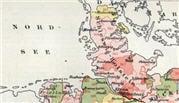Source Information
About Rehna, Germany, Births, 1876-1899
About this collection
This collection contains birth records from the German department of Rehna covering the years 1876 up to and including 1901. In the state of Mecklenburg-Vorpommern, a "department" is a subdivision within an administrative district. The city of Rehna is situated in the state Mecklenburg-Vorpommern and is centrally located in Nordwestmecklenburg about 15 miles from Lübeck, from Schwerin and from the Baltic Sea coast. The collection includes records from the registry offices of Rehna, Carlow, Demern, Schlagsdorf, Grambow and Utecht.
Beginning on January 1, 1876, birth, marriage and death records in the former German Empire were created by local registry offices. The collected records are arranged chronologically and usually bound together in the form of yearbooks. These are collectively referred to as "civil registers." Occasionally, alphabetical directories of names were also created. While churches continued to keep traditional records, the State also mandated that the personal or marital status of the entire population be recorded.
What you can find in the records
Births records were created using preprinted forms that were filled in by hand by the registrar. In each record the date of birth usually differs from the date it was registered. Depending on the individual form or on the formulations used by the registrar, you may find:
- Certificate Number
- Registration Date
- Informant: Last Name, Position, Residence
- Mother: Last Name, Maiden Name, Given Names, Residence, Denomination, Spouse
- Child: Last Name, Given Names, Birth date, Time of Birth, Sex
- Signatures
More about using this collection
Each record comprises one page. Additional events from the life of the child were sometimes recorded later on in the margins. These notes, sometimes referred to as "narration," can contain very useful information but they have not been indexed. As a result, information from the notes will not found via the search form. In cases where the child had not yet received a name at birth, the name was later added in the margin notes. As a result, such children can only be found by searching by their last name in the search form. The “Informant” was usually a nurse, midwife or relative of the child.
 Need help with the German language?
Need help with the German language?